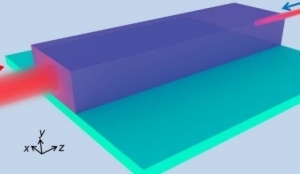Nov 1 2016
 The image above shows a weak control beam (narrow red line, far right) and a more intense laser signal (larger red line, far left) within an asymmetrical metawaveguide (purple box). (Credit: University at Buffalo.)
The image above shows a weak control beam (narrow red line, far right) and a more intense laser signal (larger red line, far left) within an asymmetrical metawaveguide (purple box). (Credit: University at Buffalo.)
For a long time, scientists have been trying to get over a paradox in the field of optics.
In order to control one light source, another light source that demands as much energy (if not more) is often necessary. Although this setup functions, it is not efficient.
Researchers have successfully demonstrated a technique to control light using a light source that requires one third of the energy usually required, or even lesser in certain cases.
This advancement, together with other developments can pave way to more energy-efficient, powerful computer chips and various other optics-based technologies.
This study, titled “Metawaveguide for Asymmetric Interferometric Light-Light Switching” was published in the latest issue of the journal Physical Review Letters.
It was co-authored by researchers at California Institute of Technology and the City University of New York.
Typically, symmetry connotes harmony and beauty. But not in this case. We’ve developed technology — an asymmetric metawaveguide — that enables a weak control laser beam to manipulate a much more intense laser signal.
Liang Feng, PhD, assistant professor in the Department of Electrical Engineering at the University at Buffalo’s School of Engineering and Applied Sciences, and the study’s lead author.
According to this study, the metawaveguide generates asymmetric reflections of the two beams of light, thus allowing the weaker beam to take control of the other beam. A metawaveguide is a small rectangular box made of silicon, which is a semiconducting material used in computer chips.
The U.S. Army Research Office, the National Science Foundation and Boeing supported this research by providing grants.